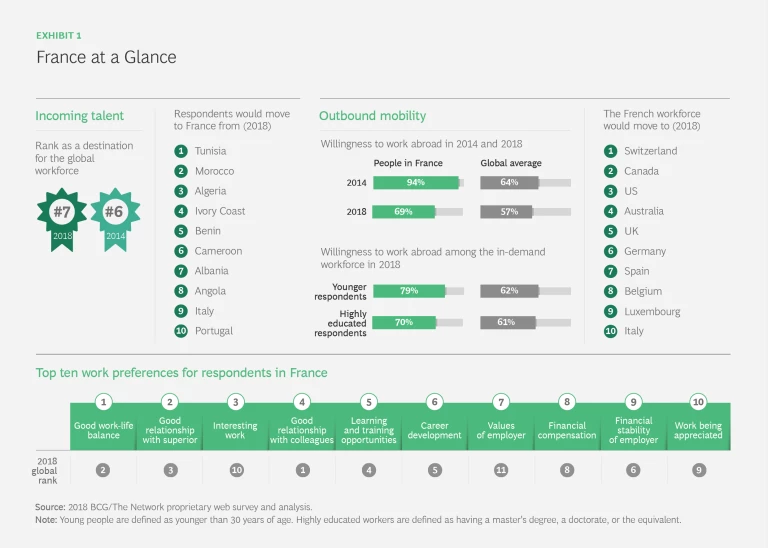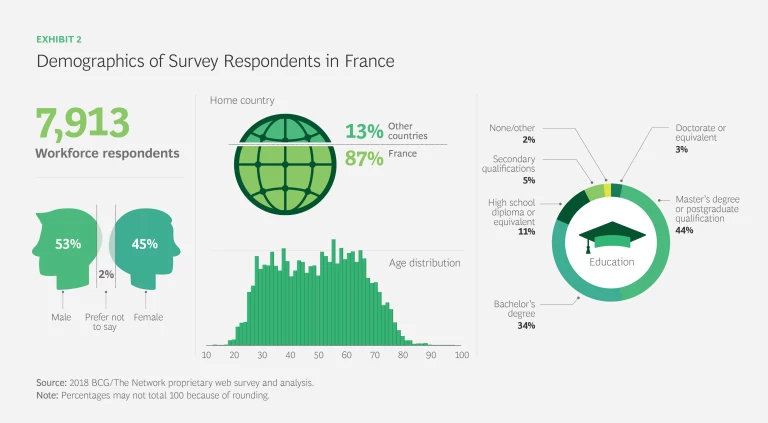This article is part of the series Decoding Global Talent 2018 . The series is based on a survey of 366,000 people in 197 countries by The Boston Consulting Group, The Network, and (in France) Cadremploi.
F rance remains one of the top destinations in the world for work but faces challenges created by a strong economy that is increasing labor demand. At the same time, perceptions of what it’s like to work in the country have not kept up with the improving circumstances.
Of global destinations for working abroad, France is the seventh most attractive, a slight drop from sixth in 2014, according to a survey by BCG and The Network.
Labor reforms, an improved business environment with a lively startup scene, and better employment opportunities could be why France remains among the ten most attractive work destinations. These factors could also explain why more residents are content to stay in the country rather than look elsewhere to advance their careers. Although 69% of French survey respondents would be willing to move abroad for work, higher than the 57% global average, the number dropped significantly from 2014.
A Revitalized Economy Adds to France’s Appeal
France is slightly more popular with respondents younger than age 30, for whom it is the sixth most attractive place to move for a job, than with older age groups, according to our survey. The country is also one of the most popular destinations for inhabitants of various French-speaking countries, as well as for residents of Italy and Portugal. (See Exhibit 1.)
Lower unemployment and a dramatic increase in jobs requiring digital and other high-level skills have kept France on many foreigners’ relocation shortlists. The country’s jobless rate is 8.9%, the lowest in close to a decade. The unemployment rate is even lower for white-collar workers: 3.5% for managers and 5.4% for midlevel professionals, all of which creates competition for individuals whose skills and experience qualify them for those positions. In addition, labor reforms and initiatives have helped revitalize the economy, which is showing signs of more consistent growth for the first time in years, adding to labor demand.
Read more about the featured countries
Read more about the featured countries
- The US Is Still the Top Work-Abroad Choice, but Its Pull Is Waning
- Germany Rises to Number Two as a Work Destination
- The UK Slips as a Hot Spot for Global Talent
- Switzerland’s Appeal Endures Despite a Dip
- Chinese Residents Are Staying Put for Work
- Russia Faces a Talent Conundrum
- Turkey’s Employers Must Capitalize on Ambitious Talent
Paris remains among the top ten cities people would move to for work. The French capital, with its combination of old-world charm and modern culture and industry, is the eighth most popular city for foreign workers. Although its appeal dropped slightly from 2014—a period in which it was the target of several highly publicized terrorist attacks—Paris still outshines top-tier cities such as Sydney and Tokyo.
The country’s digital sector is growing rapidly, adding jobs. The tech industry received a boost from the French Tech initiative, a government-backed program under which business incubators have started in multiple cities. One incubator, Station F, at a former rail freight depot in Paris, is large enough to house 1,000 startups. The activity isn’t limited to startups, though: Amazon is opening a distribution center outside of Paris, and Facebook and Google are investing in an artificial-intelligence development.
The tech boom persuaded Devon Smiley to move to Paris from Montreal in early 2018. We interviewed Smiley, 37, a self-employed consultant who teaches entrepreneurs and small business owners how to be better negotiators. She works alongside tech entrepreneurs at a coworking space in the city several days a week. Smiley, who speaks French and English, is also a regular at the city’s many tech industry networking events. Many of those meetings are held in Paris’s Sentier neighborhood, which is so thick with tech startups, it’s earned the nickname Silicon Sentier. “I could go to something every day of the week if I wanted,” she says.
As appealing a destination as it is, France has room to improve its position among the world’s most popular places to work, a circumstance that’s all the more urgent because of how quickly digital industries and startups are growing. The combination makes it more difficult for employers to find and retain top people.
France’s standing as a place to work has not improved since 2014, a somewhat unexpected development given the election of a French president who supports a global economy and a contrast to the impact of political changes on other top international destinations such as the US and the UK, which have become less open to immigration.
French residents under 30 as well as respondents with in-demand skills are more mobile than average, and when they leave the country, it further depletes the supply of available labor. (See Exhibit 2.)
Seventy-nine percent of 21- to 30-year-olds and 73% of 31- to 40-year-olds say they are willing to work abroad, compared with global averages of 61% and 58%, respectively, according to the survey. In addition, 70% of highly educated French residents—those with a master’s degree, a doctorate, or the equivalent—would be willing to go abroad for work, compared with the global average of 61%.
Employers Must Deliver What French Employees Want
To attract and retain the talent needed to keep up with growth, France’s public and private sectors must continue to make job opportunities attractive to both residents and foreigners and to entice French nationals who’ve left the country to move back.
One way to do that is to offer careers and a work environment that match French employees’ expectations and that are the same or better than what they could find elsewhere. Job elements that matter most to French survey respondents include maintaining both a good work-life balance and good interpersonal relationships. French respondents care about what they do, and they rank interesting work much higher than the global average. What a company stands for also matters more; although “company values” does not appear among the ten most important aspects of a good work environment globally, French respondents rank it seventh.
Employers also need to understand what motivates French residents to move abroad, and they must determine how to provide incentives that would entice them to come back. In considering where they would be willing to move for work, French residents put Switzerland at the top of their list, followed by Canada. The The US Is Still the Top Work-Abroad Choice, but Its Pull Is Waning fell to third from first in 2014, possibly because of concern that immigration policies there could become more restrictive as part of recent political changes.
Survey respondents in France who would go abroad for work are most likely to see a foreign experience as broadening them personally, the survey shows. Other reasons why France residents would go elsewhere are to improve their career prospects, earn more, or acquire work experience.
Quentin Chaleard, 29, first left France during college for internships in Singapore and Brazil and to travel. He opted for a job in Bangkok because the need for people with in-demand skills throughout Asia meant he could advance much faster than if he’d stayed at home. “In Asia, one can get responsibility and ownership very quickly. In France, it takes years to climb the corporate ladder,” Chaleard says.
And advance he did. After working at a food-delivery-technology startup’s Singapore office for 18 months, Chaleard transferred to the company’s headquarters in Berlin, where today he is the global director of operations. He finds Berlin more international, accepting, and integrated than cities in France but sees that comparison changing a bit, “with the French startup scene becoming stronger.”
To coax people back to France, employers need to play to the country’s strengths.
To coax people like Chaleard back to France, employers need to play to the country’s strengths, promoting a strong work-life balance, the strong labor market and improving tax system, and the opportunities provided by startups. To be more welcoming of foreign talent, they must relax immigration procedures, improve integration efforts, and work on easing language barriers. Finally, for people who might have second thoughts about relocating to London after Brexit, employers should consider positioning Paris as an attractive alternative.











